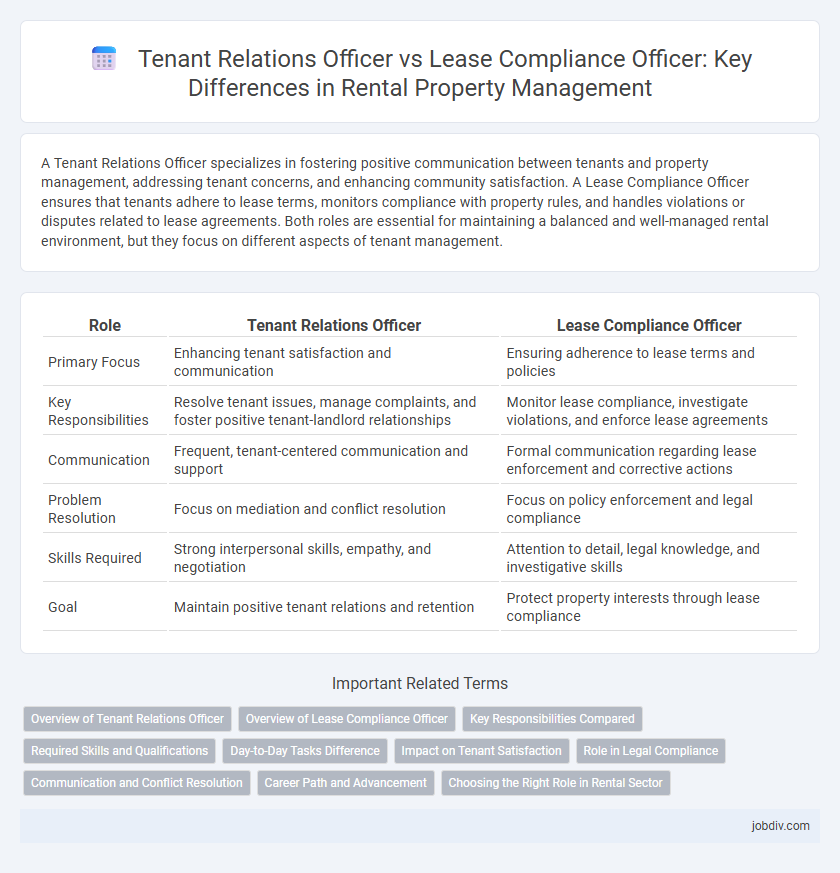A Tenant Relations Officer specializes in fostering positive communication between tenants and property management, addressing tenant concerns, and enhancing community satisfaction. A Lease Compliance Officer ensures that tenants adhere to lease terms, monitors compliance with property rules, and handles violations or disputes related to lease agreements. Both roles are essential for maintaining a balanced and well-managed rental environment, but they focus on different aspects of tenant management.
Table of Comparison
| Role | Tenant Relations Officer | Lease Compliance Officer |
|---|---|---|
| Primary Focus | Enhancing tenant satisfaction and communication | Ensuring adherence to lease terms and policies |
| Key Responsibilities | Resolve tenant issues, manage complaints, and foster positive tenant-landlord relationships | Monitor lease compliance, investigate violations, and enforce lease agreements |
| Communication | Frequent, tenant-centered communication and support | Formal communication regarding lease enforcement and corrective actions |
| Problem Resolution | Focus on mediation and conflict resolution | Focus on policy enforcement and legal compliance |
| Skills Required | Strong interpersonal skills, empathy, and negotiation | Attention to detail, legal knowledge, and investigative skills |
| Goal | Maintain positive tenant relations and retention | Protect property interests through lease compliance |
Overview of Tenant Relations Officer
A Tenant Relations Officer serves as the primary point of contact between property management and tenants, handling inquiries, resolving complaints, and ensuring tenant satisfaction. Their role involves facilitating effective communication and fostering positive relationships to maintain tenant retention and community harmony. This position requires strong interpersonal skills, conflict resolution abilities, and knowledge of housing regulations to address tenant concerns efficiently.
Overview of Lease Compliance Officer
A Lease Compliance Officer ensures tenants adhere to lease agreements by monitoring lease terms, addressing violations, and coordinating with legal teams to resolve disputes. This role requires detailed knowledge of property regulations, contract laws, and tenant rights to maintain property integrity and minimize financial risks. Their proactive enforcement of lease conditions supports the overall stability and profitability of rental properties.
Key Responsibilities Compared
Tenant Relations Officers focus on maintaining positive communication between tenants and property management by addressing tenant concerns, resolving disputes, and coordinating community activities. Lease Compliance Officers ensure tenants adhere to lease terms by monitoring lease agreements, conducting inspections, and enforcing compliance with property rules and regulations. Both roles aim to enhance tenant satisfaction and property integrity but differ in their emphasis on relationship management versus regulatory enforcement.
Required Skills and Qualifications
Tenant Relations Officers require strong communication skills, conflict resolution abilities, and customer service experience to effectively manage tenant interactions and address concerns. Lease Compliance Officers need expertise in legal regulations, detailed knowledge of lease agreements, and analytical skills to ensure adherence to terms and resolve violations. Both roles benefit from proficiency in property management software and an understanding of housing laws.
Day-to-Day Tasks Difference
A Tenant Relations Officer primarily handles tenant communication, addressing complaints, coordinating maintenance requests, and fostering positive tenant experiences to ensure satisfaction. In contrast, a Lease Compliance Officer focuses on monitoring adherence to lease agreements, conducting property inspections, and enforcing lease terms to prevent violations. While both roles support rental operations, the Tenant Relations Officer emphasizes tenant engagement, whereas the Lease Compliance Officer centers on regulatory enforcement and lease adherence.
Impact on Tenant Satisfaction
Tenant Relations Officers directly enhance tenant satisfaction by addressing concerns, facilitating communication, and fostering a positive community atmosphere. Lease Compliance Officers ensure tenant adherence to lease terms, which supports property standards but may cause tension if enforcement is perceived as strict. Balancing proactive tenant engagement with fair lease enforcement significantly influences overall tenant satisfaction and retention.
Role in Legal Compliance
Tenant Relations Officers facilitate communication between tenants and property management, ensuring tenant concerns and requests comply with housing laws and lease agreements. Lease Compliance Officers specialize in monitoring lease adherence, identifying violations such as unauthorized subletting or rent defaults, and enforcing corrective actions based on legal statutes. Both roles are critical in maintaining legal compliance and protecting the rights and responsibilities of landlords and tenants within rental agreements.
Communication and Conflict Resolution
Tenant Relations Officers specialize in proactive communication, fostering positive relationships by addressing tenant concerns promptly and ensuring clear, consistent information flow. Lease Compliance Officers focus on enforcing lease terms through direct interaction to resolve conflicts related to violations, employing negotiation and mediation skills. Both roles require strong communication and conflict resolution abilities, but Tenant Relations Officers emphasize collaboration, while Lease Compliance Officers prioritize adherence to lease agreements.
Career Path and Advancement
Tenant Relations Officers typically advance by gaining expertise in conflict resolution and customer service, often moving into property management or community liaison roles. Lease Compliance Officers progress by developing in-depth knowledge of legal regulations and lease agreements, with career growth leading to senior compliance or risk management positions. Both paths benefit from certifications in property management and real estate law to enhance career opportunities and salary potential.
Choosing the Right Role in Rental Sector
A Tenant Relations Officer primarily focuses on maintaining positive communication and resolving tenant issues to enhance resident satisfaction and retention. In contrast, a Lease Compliance Officer ensures tenants adhere to lease terms, monitoring legal and contractual obligations to mitigate risks for property owners. Choosing the right role depends on whether the emphasis is on tenant engagement and community building or on enforcement and regulatory compliance within the rental sector.
Tenant Relations Officer vs Lease Compliance Officer Infographic

 jobdiv.com
jobdiv.com